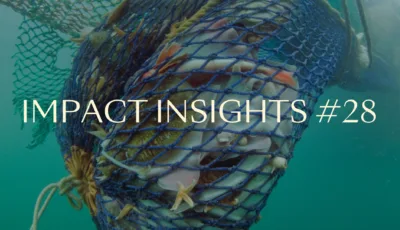Impact Insights #20

We have gathered the most recent news in impact investing and sustainability, to keep you up-to-date on the essential developments of the industry.
■ World leaders have signed a Pact for the Future
Halfway through this decade, only 17% of the UN Sustainable Development Goals targets are on track, and 17% are even regressing. After nine months of negotiations, world leaders gathered during the UN Summit of the Future and adopted a Pact for the Future. This Pact symbolizes a renewed commitment to global cooperation, and lays out 56 actions to turbocharge the SDGs. such as recommitting to nuclear disarmament, and mobilizing more financing for developing countries. The Pact also includes the first-ever Declaration on Future Generations, committing to more opportunities for young people "to participate in the decisions that shape their lives, especially at the global level". Another crucial aspect of this pact is the introduction of a Global Digital Compact for digital governance. This comes hopefully as a positive advancement for multilateralism, in a context where geopolitical tensions deeply prevent progress towards achieving the SDGs.
■ Investors’ requirement to measure and report impact outcomes could burden businesses in emerging markets, and slow down impact efforts in these regions
One of the main challenges for impact investors today is the lack of accurate impact data to guide portfolio construction, monitoring, and reporting. A new Oxford University report “No Data, No Deal?” highlights that the financial and human resources needed to implement Impact Measurement and Management (IMM) can make life harder for businesses in emerging markets. Due to strict regulations and investment mandates, measuring and reporting impact is required by investors, but may feel like a bureaucratic burden for companies doing real-life impact. More nuanced approaches are needed, whereby governments could openly share more data, and investors could simplify data requirements on complex topics and focus on the most relevant indicators relative to the region and industry companies evolve in.
■ Study confirms that aligning your business with the SDGs reduces risk of being involved in scandals
The Dutch asset manager Robeco partnered with the University of Zurich to study the relationship between corporate sustainability and involvement in scandals. The study found that the higher the alignment of companies with the SDGs, the less likely they were to be involved in severe scandals related for instance to corruption, fraud, or environmental pollution. Companies in resource-intensive sectors such as Energy & Utilities are a clear example. Oil exploration makes it more likely to provoke accidents that, with the scrutiny the sector faces, will turn into scandals. This is one of many empirical studies highlighting the long-term financial and reputational consequences of involvement with unsustainable business activities. As regulations become more stringent and investors reduce their exposure to these risks, aligning one’s core business model with the SDG can be the most powerful action to future-proof a company.
■ Increasingly more investors believe in direct lending as capable of achieving impact results
Impact investing is traditionally associated with private equity and venture capital, but as the industry matures, an increasing number of players explore impact investing in more diverse asset classes. For instance, the number of private credit impact funds grew by 71% from 2018 to 2023. Among the newcomers wanting to balance their impact ambitions with the need for risk-adjusted returns, the credit manager Alcentra recently released a whitepaper supporting the idea that direct lenders are well-positioned to achieve impact in both developed and developing markets. Indeed, the close relationship this type of investor would build with companies enables them to influence investees more and integrate impact in the deal structure. Alcentra is now integrating impact aspects throughout its portfolio by, among other things, embedding impact KPIs into loan documentation, tying the positive outcomes the borrower can achieve to financial incentives.
■ 35,000 funds added to the first-ever open-access database for investors to scientifically assess funds’ net impact
Finnish data provider Upright recently added 35,000 mutual and exchange-traded funds to an open-access global impact database. The purpose of this database is to give retail and professional investors the opportunity to compare funds based on their net impact on society in terms of environmental, social, health, and knowledge contributions. Upright’s proprietary model on which the database relies has analyzed over 250 million scientific articles to assess the net impact of many products and services, rather than relying on less detailed and transparent data such as ESG ratings or fund sustainability labels such as SFDR’s article 6, 8 and 9.


